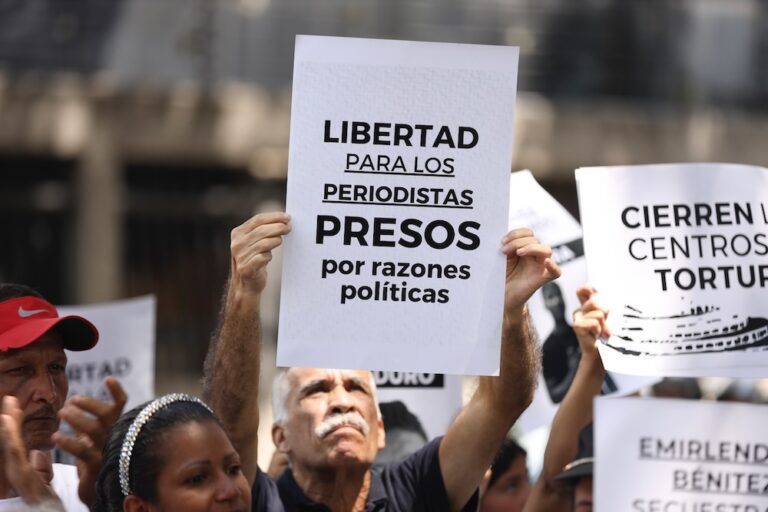(RSF/IFEX) – Reporters Without Borders has voiced concern about a decision by one of the trial chambers of the International Criminal Tribunal for the former Yugoslavia (ICTY) to order prosecutors to find out how a document classified as confidential by the court was leaked to several Croat media. The order could lead to the media […]
(RSF/IFEX) – Reporters Without Borders has voiced concern about a decision by one of the trial chambers of the International Criminal Tribunal for the former Yugoslavia (ICTY) to order prosecutors to find out how a document classified as confidential by the court was leaked to several Croat media. The order could lead to the media being prosecuted.
Journalists have until now only been prosecuted by international courts for allegedly revealing the identity of nationally protected witnesses ( see http://www.rsf.org/IMG/pdf/rapport_fr.pdf ).
This order poses a new kind of threat to journalists covering the ICTY and could constitute a disturbing violation of press freedom and the right to critical and independent coverage of international tribunals.
The order was issued by the chamber that is trying three former Croat generals, Ante Gotovina, Ivan Cermak and Mladen Markac. The chamber told the prosecutor’s office on 1 June 2007 to investigate the origin of the leak four days earlier of a confidential annex that had been submitted by the prosecutor’s office.
No international tribunal has ever brought a prosecution of this nature against news media that cover its proceedings. Until now, the only prosecutions were based on the claim that journalists had, potentially at least, jeopardised the safety of witnesses who had been beneficiaries of protection orders issued by the tribunal. In 2006, Reporters Without Borders voiced concern about the grounds and circumstances of such prosecutions by the ICTY and the International Criminal Tribunal for Rwanda (ICTR). Some of these prosecutions resulted in severe sentences.
“The investigation ordered by ICTY judges on 1 June and the statements by the tribunal’s spokesperson at a press briefing on 31 May are even more disturbing,” Reporters Without Borders said. “If the ICTY prosecutes journalists for divulging legal documents simply because it had declared them to be confidential, this would be a serious abuse of authority and a retrograde step in press freedom.”
The organisation added: “The threat of such prosecutions would undermine the ability of journalists to cover international courts in an independent fashion. It would inevitably be used by other courts, including international ones, against journalist considered overly critical. We reiterate our concern about the precedents being set by this UN tribunal and we voice concern about the threats to press freedom that these latest developments represent.”
The leaked document, submitted to the chamber on 17 May, contained the names of seven senior Croat officials identified by the prosecutor’s office as being party to the criminal enterprise for which the three generals are being tried. The prosecutor’s office produced the document in response to a request from the chamber’s judges for more details about the alleged criminal enterprise and its participants. The list consists of three former ministers or junior ministers, a former gendarmerie chief and three former military commanders (two of whom have been publicly charged by the ICTY and have been transferred for trial in Croatia).
The prosecutor said the document would have to be confidential because, in certain countries, the names of accomplices not formally included in an indictment are not normally supposed to appear in public court documents. But at the same time, he acknowledged that the ICTY and other international tribunals do not observe this restriction. He also acknowledged that, even if there was no new indictment, the names of the seven persons would almost certainly be mentioned during the trial.
According to the news agency Sense, which permanently covers the ICTY, the document’s contents were revealed by Croat TV station HRT on 28 May, and were then picked up by other local media outlets, including Jutarnji List, Vecernji List and the news agency Hina.
As a result of the leak, one of the defence teams asked the chamber to declassify the document and the court complied on 31 May. Since then, it has officially been in the public domain.
Nonetheless, according to the ICTY website’s account of a press briefing on 31 May, ICTY registry and chambers spokesman Refik Hodzic said: “If there was a confidential document that was leaked in the media, this would be a breach of the document’s confidentiality, and it could cause consequences for those responsible.” It could “constitute contempt of court”, he said.
Hodzic then went on to say: “There was a very strange interpretation in the media that it would be a fair game to publish a document filed confidentially before the trial chamber ruled to lift its confidentiality. Publishing a document filed confidentially constitutes a breach of tribunal’s rules and there are no two ways about it [ICTY Weekly Press Briefing, 31 May 2007].”
It was the day after the press briefing that judges ordered the investigation that could result in contempt of court proceedings being brought against HRT at least, if not the other media outlets involved, as well.


